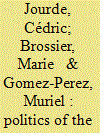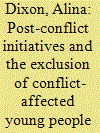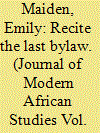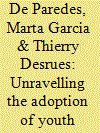|
|
|
Sort Order |
|
|
|
Items / Page
|
|
|
|
|
|
|
| Srl | Item |
| 1 |
ID:
179121


|
|
|
|
|
| Summary/Abstract |
The term ‘amaphara’, possibly derived from ‘parasites’, burst into South African public culture in the 2010s to refer to petty thieves addicted to a heroin-based drug locally called whoonga/nyaope. Drawing on ethnography and media sources to interrogate the rise of ‘amaphara’, this paper argues that South Africa's heroin epidemic magnifies the attention – criticism but also sympathy – directed toward marginalised black men who have few prospects for social mobility. It locates amaphara in the national context where drug policy is largely punitive and youth unemployment rates are painfully high, but gives particular attention to families’ and communities’ experiences with intimate crimes, especially petty thefts. It further shows that amaphara is a contested term: heroin users are brothers, sons and grandchildren and they gain most of their income not from crime but by undertaking useful piece work in communities.
|
|
|
|
|
|
|
|
|
|
|
|
|
|
|
|
| 2 |
ID:
179123


|
|
|
|
|
| Summary/Abstract |
Preachers of the prosperity gospel in Nigeria criticise politicians’ greed and government corruption, even as many church leaders amass great wealth themselves. Drawing on ethnographic research, this article explores the relationship between Pentecostalism's prosperity gospel and political culture in Nigeria, especially as it pertains to problems of inequality and corruption. The analysis builds on a case study of one particular prosperity church in the city of Umuahia. It addresses the paradox that this brand of Pentecostalism articulates widespread discontent with the venality plaguing national political culture, while at the same time offering divine justification for the pursuit and accumulation of wealth. Examining not only Pentecostals’ interpretations of corruption, but also people's responses to scandals within these churches, the paper attempts to understand why Nigerians who are so aggrieved about corruption and inequality are at the same time drawn to churches that appear to reproduce many of the same dynamics.
|
|
|
|
|
|
|
|
|
|
|
|
|
|
|
|
| 3 |
ID:
179118


|
|
|
|
|
| Summary/Abstract |
This article analyses how the state in Senegal has managed the hajj since the liberalisation era in the early 2000s. Although the essence of the hajj is religious, it is also deeply political and requires that the state manages complex relations with pilgrims, religious leaders, private travel agencies, politicians and Saudi authorities. This article argues that three inter-related imperatives structure the conduct of the Senegalese state: a security imperative, a legitimation imperative, and a clientelistic imperative. Security concerns lead the state to monitor and control pilgrims travelling to Mecca. Legitimation is seen in the collaborative relations with Sûfi orders and in the framing of the hajj organisation as a ‘public service’. Finally, given the magnitude of financial and symbolic resources attached to the hajj, clientelistic relations are constitutive of state officials’ actions. Overall, despite the post-2000 liberalisation of the hajj, the state has maintained its role as a gatekeeper, regulator and supervisor.
|
|
|
|
|
|
|
|
|
|
|
|
|
|
|
|
| 4 |
ID:
179119


|
|
|
|
|
| Summary/Abstract |
Young people are among the most severely impacted by conflict and as such many post-conflict initiatives are aimed at assisting them. Yet the impacts of these initiatives on young people's ability to successfully overcome the adversity they faced during conflict are not fully understood. This paper attempts to examine these impacts by conceptualising post-conflict initiatives as enmeshed within young people's social environments. It argues that post-conflict initiatives are intimately connected to broader processes of exclusion from social systems such as the family. While these systems had previously served to protect young people against adversity, conflict and post-conflict initiatives have disrupted their ability to continue this mission. In particular, the structure and function of the family system are examined to demonstrate the types of disruptions that have taken place that have ultimately negatively impacted the landscape in which young people develop.
|
|
|
|
|
|
|
|
|
|
|
|
|
|
|
|
| 5 |
ID:
179122


|
|
|
|
|
| Summary/Abstract |
In the study of modern chieftaincy in Africa, scholars have identified chiefs as important intermediaries for promoting increased voter turnout, new health policies and development initiatives. I add to this literature the importance of chiefs as cultural intermediaries. Using recent child marriage reform efforts in Malawi as a case study, I find that chiefs are key actors needed to implement culturally embedded policy changes. Drawing on descriptive evidence from 12 months of fieldwork across all three regions of Malawi, I find that chiefs are responsible for shifting cultural practices related to child marriage. Using a unique blend of democratic and non-democratic powers, chiefs in Malawi are defying expectations and using their position to promote girls’ rights. These findings contribute to our broader understanding of the political and cultural power of modern chiefs.
|
|
|
|
|
|
|
|
|
|
|
|
|
|
|
|
| 6 |
ID:
179120


|
|
|
|
|
| Summary/Abstract |
Parliamentary youth quotas have been adopted by nine countries, mainly African autocracies. They have also attracted the attention of international organisations, which consider them indicators of democratic progress. Why were these quotas adopted? This article challenges the long-standing regime survival thesis by explaining quota adoption as the result of the convergent strategies of actors placed inside and outside the regime. It also provides new theoretical arguments that point to the transformation of representative linkages in hybrid regimes and shows how this is justified in the light of empirical evidence grounded on qualitative methodology and extensive fieldwork. By connecting the broader historical and socio-political context where youth quotas emerged – Africa – to the micro-level processes of quota adoption – based on the Moroccan case – this article provides a dynamic picture of how political representation is claimed and mobilised in contemporary Africa while shedding some light on the inclusive limits of quota policies.
|
|
|
|
|
|
|
|
|
|
|
|
|
|
|
|
|
|
|
|
|